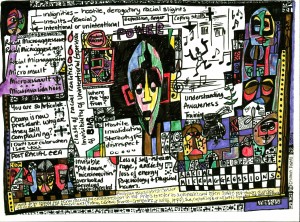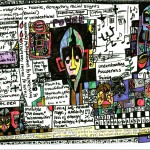By Chioma Anah, EdD, ATR, NCC, LCPC, ACS

American Harvard Psychiatrist, Chester Middlebrook Pierce first coined the term racial microaggression in the 1970s to refer to automatic and often subtle “put downs” directed toward African Americans (Dr. Pierce is currently Emeritus Professor of Education and Psychiatry at Harvard Medical School). In 2007, Columbia professor Derald Wing Sue, who is recognized as one of the most influential scholars focusing on the study of racial microaggressions, expanded on the work of Pierce and colleagues, and proposed a conceptual framework of how racial microaggressions manifest in the everyday lives of people of color. Dr. Sue defined racial microaggressions as, “Brief and commonplace daily verbal, behavioral, and environmental indignities, whether intentional or unintentional, that communicate hostile, derogatory, or negative racial slights and insults to the target person or group.”
Key points about Racial Microaggressions:
a) It is not the “old fashioned” Jim Crow type of racism that is most hurtful to Black Americans, but the new contemporary and subtle forms of racism known as racial microaggressions. Despite the election and re-election of an African American male president, we are not living in a “post-racial” era.
- In 2010, it was estimated that, 68% of African Americans were dissatisfied and reported inequalities and racism in their daily lives- while 71% of Whites reported satisfaction with the way racial relations was.
- These percentages might be different today in 2015, given all the racial unrest following the Trayvon Martin, Michael Brown, and Eric Garner tragedies. It is hard to forget the images of protests and riots in Ferguson, Missouri, and subsequently, in many other cities around the United States.
b) They are subtle, insensitive, automatic and sometimes unconscious verbal, non-verbal, and/or visual insults and indignities directed towards Black American people or people of color.
c) They are quick, everyday interactions that send hurtful, denigrating messages to Black Americans and other people of color that implies that: * they do not matter;*they are not valued or respected; *they are lazy; they are unintelligent; *they are invisible; *they are always aggressive and angry; *they are criminals and should be feared at all times; *they are dangerous and a threat to society; *they are sub-human and demon-like; *they are all the same; and that *they are second-class citizens.
e) Racial microaggression can be invisible, often overlooked, and sometimes unconscious. However, they can be very damaging, and could create lethal consequences for the recipient. The most lethal and extreme example of the consequences of racial microaggressions, came in the case of Officer Darren Wilson and his reaction when he saw Michael Brown:
- 29-year old White Officer, Darren Wilson, shot and killed 18-year old Michael Brown on August 9, 2014. This is what Officer Wilson saw, the day he shot Michael Brown- in his words: “I felt like a five-year old holding onto Hulk Hogan…Hulk Hogan, that’s just how big he felt and how small i felt just from grasping his arm…The only way I can describe it, it looks like a demon, that’s how angry he looked. He comes back towards me again with his hands up…At this point it looked like he was almost bulking up to run through the shots, like it was making him mad that I’m shooting at him. And then when it [the bullet] went into him, the demeanor on his face went blank, the aggression was gone, it was gone, I mean I knew he stopped, the threat was stopped.
f) Perpetrators of racial microaggression are often well-intentioned Whites in American society who are unaware of the highly charged racial situations. They are often the product of America’s complicated history with race and still harbor racial biases and display discriminatory behaviors towards Black Americans in all areas of society, including education and employment.
g) Racial microaggressions could be challenging for all involved because of the clash of racial realities; the racial reality of Black Americans is different from that of White Americans. In some cases, when the victim confronts the perpetrator about the racial microaggressions that they have just experienced, the perpetrator’s responses run the gamut from, pointing out that he or she only meant the slights as a compliment, to claiming that the comment was merely a joke. Further, the perpetrator sometimes accuses the recipient of being too sensitive when they are offended by the comment or action.
h) Many of the perpetrators of racial microaggressions blame the victim…”If only Black people worked harder, they would be successful,” or, “Not everything is about race.”
i) Racial microaggressions create psychological harm for Black Americans manifested in symptoms that include, depression, paranoia, anxiety and PTSD.
j) Racial microaggressions create physiological harm for Black Americans. According to Adewale Troutman, MD, Director, Louisville, KY Department of Public Health & Wellness, and S. Leonard Syme, Professor of Epidemiology, UC Berkeley, there are significant effects of racism on the health outcomes of people of color. Through research, Dr. Troutman suggests that, “If you are African American, no matter your social status; your health outcomes are going to be worse than that of your White counterpart.” He goes on to state that African American’s die earlier than Whites and have higher rates of medical diseases such as diabetes, hypertension, high blood pressure, and coronary artery disease. Dr. Syme adds that, “Hyper vigilance and the burden of constantly being on guard (as a Black American) over time, changes biological markers that make people vulnerable to getting sick.”
k) Racial microaggression is often downplayed, ignored and/or dismissed as a legitimate issue, and many White Americans question the existence of racial prejudice and discrimination, particularly when the country elected a Black President twice in a row.
16 examples of Racial Microaggressions (These are examples of actual experiences of many Black Americans):
1) “You should be proud of yourself. You are not like the rest of them; you are a credit to your race.”
2) “You sounded so different on the phone; you were not what I expected.”
3) “Sorry, I thought you were the nurse, not the doctor.”
4) “You guys must be really happy now that Obama is president, there should be no more excuses or complaints from you people.”
5) “I’m surprised you haven’t seen, ’12 Years A Slave’ yet, I though you would be one of the first people to go watch it.”
6) “You are so exotic looking. What are you?”
7) “That was really a great class, Dr. Smith, but next week, you may want to think about doing a role-play to demonstrate your examples because I learn better that way as a student…I’m just saying.”
8) “Hey, I’ve been stopped by cops before, just driving and I didn’t make a capital case about it. Not everything is about race.”
9) “Why does every Black person pull the race card whenever they are backed into a wall? Many of the seemly racially motivated bad experiences they have experienced, I’ve experienced some of them as well, and besides, if it quacks like a duck and walks like a duck, well, it’s a duck!”
10) “People are people. I really don’t see race or color in this situation.”
11) “Do you think your stress is from something else instead of your everyday racial experiences?”
12) “The President of the United States is Black. I really don’t see where all this racial angst is coming from. Why are you people still so angry?”
13) “How do Black people feel about…?” (Fill the blank with every issue relating to Black society- as if they are the spokesperson for all issues concerning Blacks in society).
- How do Black people feel about Obama, now that he’s not so popular?
- How do Black people feel about Tiger Woods…?
- And the list goes on…
14) “Wow, you listen to Radiohead, and you actually know who Beck is? I though Kanya West and Jay-z would be more your speed.”
15) “You have a nice home, you drive a nice car, and you are living the ‘American Dream’ what else do you have to complain about? You are doing better than most Whites…but you always complain about your poor treatment because of your race. Look at everything that you have…what is the problem?”
16) “I have lots of Black friends, I am not racist!”
President Obama’s experiences of Racial Microaggressions:
Following the acquittal of George Zimmerman in the Trayvon Martin case, President Obama gave a speech to the public. Although he did not mention it by name, many of the experiences President Obama describes here are racial microaggressions:
“Trayvon Martin could have been me 35 years ago…I think it’s important to recognize that the African American community is looking at this issue through a set of experiences and a history that doesn’t go away…There are very few African American men who have not had the experience of being followed when they were shopping in the department store. That includes me. And there are very few African American men who haven’t had the experience of walking across the street and hearing the locks click on the doors of cars. It happens to me, at least before I was a senator. There are very few African Americans who haven’t had the experience of getting on the elevator and a woman clutching her purse nervously and holding her breath until she had a chance to get off. That happens often” (Obama, 7/19/ 2013).
Artwork/Responses regarding Racial Microaggressions- 2014-2015:
“Artists are the gatekeepers of truth. We are civilization’s radical voice.” – Paul Robeson


What can be done about Racial Microaggressions?
a) Recognizing and acknowledging our difficult history with race in the United States, and acknowledging and confronting our own cultural biases, assumptions and worldview.
b) Understanding that race matters in the United States, and that racism and injustice hurts ALL of us.
- Increasing our awareness about issues of race and diversity in the United States.
- Using our understanding of diversity and race in a way that connects all of us with the common goal of creating a more socially just environment.
c) Improving our education and training surrounding cultural sensitivity in an effort to combat acts of microaggression.
d) Engaging in Appropriate Planning & Action about racial microaggression, which includes facilitating and encouraging open and honest discussion on the subject of race, culture and microaggressions with different races. Again, the goal here is to create awareness, understanding, healing, and appropriate action, leading to a more socially just and culturally sensitive nation.
***Have you experienced Racial Microaggressions? Do you recognize yourself in this post as the perpetrator or the victim of racial microaggressions?
- What are the best ways to respond to racial microaggressions when they occur?
- How can an awareness of racial microaggression inform society around the issue of diversity?
- What do you think can be done about combating racial microaggressions in society?
We would like to hear from you.
Chioma Anah, EdD, ATR, NCC, LCPC, ACS
Brief Bio: Dr. Chioma Anah has a doctorate in Counseling Psychology, is a Registered Art Therapist (ATR), National Certified Counselor (NCC), Licensed Clinical Professional Counselor (LCPC- Maryland), Approved Clinical Supervisor (ACS), and Founder, CEO, & Director of PerceptA Therapeutic and Training Center, LLC. She has over 15 years experience in the clinical field working with at-risk adolescents, adults and families of all races and cultural background. Dr. Anah’s research interest includes multicultural issues in counseling; specializing in racial microaggressions in everyday life and implications for clinical practice. Dr. Anah is committed to highlighting the impact of racial microaggressions, multicultural issues, and social justice issues, as it relates to diverse clients in therapy.
Contact Dr. Anah regarding this post: Email: dr.c.anah@gmail.com

